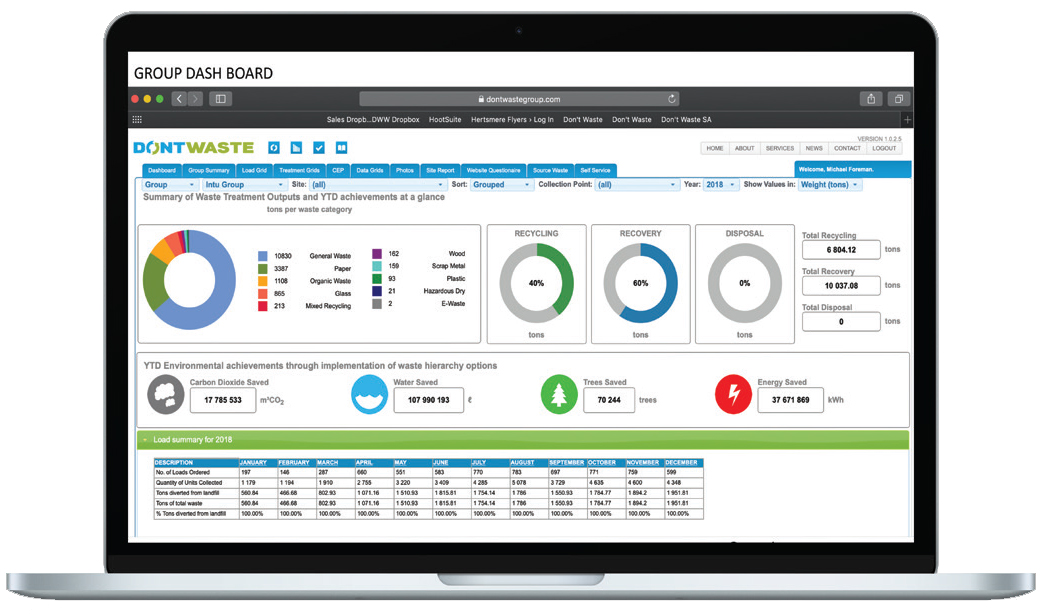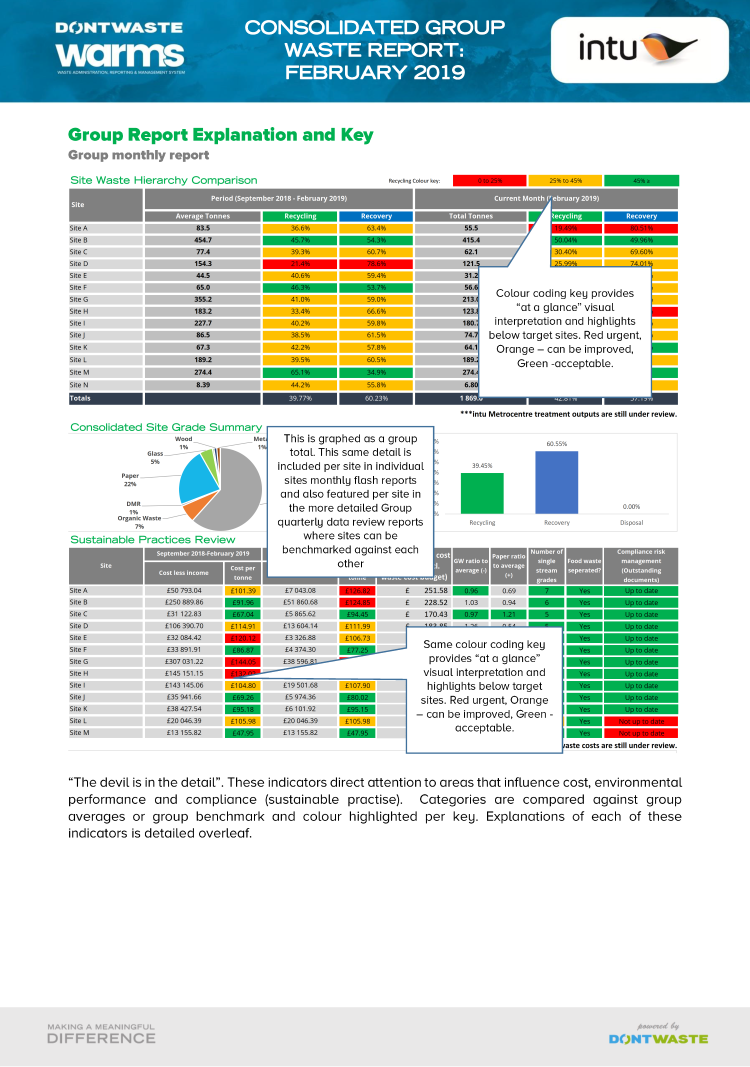intu’s Award-Winning Partnership with Don’t Waste Delivers Impressive Results
30 July 2020intu’s Award-Winning Partnership with Don’t Waste Delivers Impressive Results
30 July 2020With the waste industry under the spotlight to improve data accuracy and transparency, intu has partnered with Don’t Waste to lead the UK shopping centre sector in accurately reporting and proactively managing waste. Together, they have piloted and rolled out a new waste reporting and auditing system that has transformed data accuracy and is empowering property teams to increase recycling, realise efficiencies and reduce costs.
Key Facts
- £160,000 cost savings achieved
- 10% increase in recycling in six months
- Zero waste to landfill
- Partners in Waste Management Award
Situation
As the owner of many of the UK’s largest and most popular shopping centres, intu aims to create sustainable positive change in its communities and the environment. It has diverted 100% of waste from landfill since 2016 and achieves high recycling rates. However, like many UK property companies, intu was receiving inconsistent and unreliable waste data from multiple service providers, restricting the ability of property teams to proactively and efficiently manage waste.
intu has been on a three-year journey to improve waste data robustness and drive improvements in waste management practices and performance. After reviewing solutions offered by waste service providers, intu opted to become one of the first companies to pilot Don’t Waste UK’s reporting and auditing system and app. This provides independent and consistent waste data, along with reports and analytics highlighting opportunities to improve recycling, realise efficiencies and achieve cost savings. intu went on to become the first UK property owner to pilot a Group-wide waste reporting framework that compares individual sites to a sustainability good practice standard that it developed with Don’t Waste.

Actions
intu launched a trial of the Don’t Waste platform at two centres in 2016, engaging with property teams and waste management partners. The Don’t Waste system tracks all waste movements and, in the case of mixed streams, tracks recycling rates for individual streams at Materials Recycling Facilities to ensure data accuracy. Through this process, intu and Don’t Waste integrated data from multiple service providers in different areas, into a single online platform and presented it consistently. This approach significantly enhanced data robustness and waste management practices, highlighting opportunities for improvement.
Building on this success, intu began a phased rollout of the system across its entire shopping centre portfolio in 2018. This process wrapped up in early 2019. Consistent terminology and waste stream categories were adopted across all suppliers. Every instance of waste collection is now routed through the Don’t Waste platform using the Don’t Waste app. All documents, including Waste Transfer Notes, invoices, rebates and weighbridge certificates are reconciled and accessible online.
Regular reporting includes monthly Centre and consolidated Group reports on performance, along with quarterly and annual reports that offer detailed analysis and recommendations for cost, efficiency and environmental savings. This empowers intu to set realistic goals, plan improvements and monitor impacts.
Accurate benchmarks also help intu and facilities management teams prioritise actions. For instance, where rebates for cardboard were significantly below the benchmark, intu engaged with waste service providers to secure improved rebates for occupiers.
Facilities management teams are actively engaging with occupiers on waste management, using visual materials provided by intu and Don’t Waste. These include posters, newsletters and quarterly occupier reports.
The platform has also supported intu in developing a strategic waste improvement plan, which it will roll out across all centres, and in setting realistic waste management targets as part of its 2030 sustainability strategy.

Financial
- £160,000 of cost savings achieved in 12 months, including increased rebates and more efficient waste collections.
- £237,000 additional cost savings opportunities identified.
- Six month estimated payback period for the platform on average.
Benefits
- Transforming data accuracy, consistency and transparency, which has empowered intu and property teams to improve waste management practices and performance.
- Improving waste reporting for stakeholders, including occupiers and investors, who are increasingly focused on environmental performance.
- Increasing the Group recycling rate by 10% over six months (September 2018 to February 2019).
- Highlighting efficiency opportunities, such as unnecessary daily bin collections, that deliver environmental and cost savings.
- Benchmarking and comparing waste management performance across shopping centres, to drive progress. As more waste companies and property owners improve data accuracy and consistency, this will also enable meaningful benchmarking industry-wide.
- Supporting intu’s sustainability goals and informing realistic target setting for intu’s 2030 strategy development.
- Testing and developing the Don’t Waste UK platform, which has since been adopted by other UK property owners.
Recognition through awards:
- Partners in Waste Management Award 2019 winner, at the prestigious PFM Partnership Awards.
- Two Green Apple Awards for Environmental Best Practice at intu Trafford Centre and intu Watford.
- Shortlisted for the Waste Management Award at the 2019 Sceptre Awards.
Challenges and Achievements
INDUSTRY
Why is it so important that the industry improves data accuracy and consistency?
Many UK property owners are being provided with inaccurate and inconsistent waste data by their waste services providers. This often results in over-reporting of recycling. For instance, dry mixed recycling sent to a Materials Recycling Facility (MRF) may be reported as 100% recycled, whereas some MRFs recycle less than 50% of plastic, card and glass, sending the remainder for incineration. Improved data accuracy resulted in intu’s reported recycling rate falling from 63% in 2017 to 43% in 2018. However, actual recycling rates increased by 10% over six months, as property teams acted on data and analytics to improve performance. More robust reporting is urgently needed, both to improve performance and to enable meaningful benchmarking for stakeholders, including occupiers and investors. The Managing Agents Partnership has provided guidance to help the industry through a standardised waste reporting framework (more here).
ENGAGEMENT
How to bring property teams and occupiers on board?
In each new centre, Don’t Waste provided training on site to facilities management teams, including operatives who handle waste and managers who review performance and drive progress. Don’t Waste regularly supports property teams via conference calls and site visits, as well as providing centres with monthly, quarterly and annual reports. Most property teams talk with the Don’t Waste team every few weeks and use the online platform daily, to order loads, monitor data and review reports. Monthly reports highlight issues related to specific occupiers and locations, including photos of waste contamination and hygiene issues, empowering property teams to take action. Visual materials have also been important in bringing occupiers on board, increasing focus on putting materials in the right bins, reducing contamination, increasing recycling rates and cutting costs for occupiers.
Example occupier report extract

Example occupier campaign materials

*Please note that the information on this page was supplied by the BBP Member and the BBP assumes no responsibility or liability for any errors or omissions in the content

